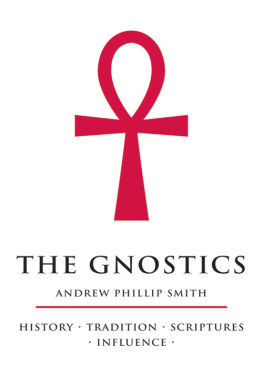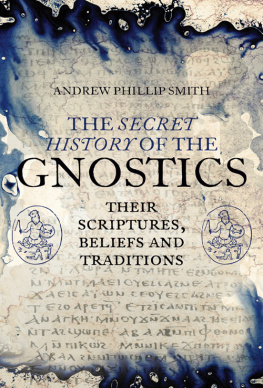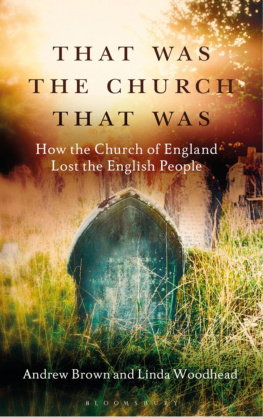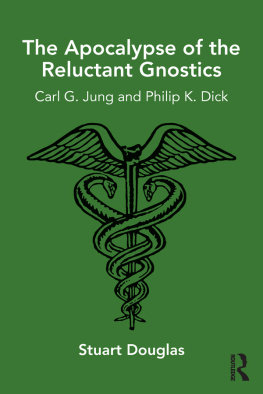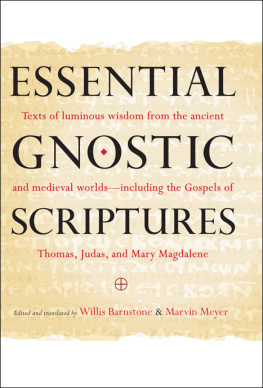THE GNOSTICS
Andrew Phillip Smith is the editor of The Gnostic magazine and the author of several books on Gnosticism and early Christianity: Gnostic Writings on the Soul, The Lost Sayings of Jesus and The Gospel of Philip. He also runs a small publishing company, Bardic Press, publishing reprints and niche works in the areas of Gnosticism and early Christianity, Celtic interest, Gurdjieff/Fourth Way and Sufi poetry. Born in Penarth, Wales, he now lives with his family in Dublin.
By the same author
The Gospel of Thomas: A New Version Based on its Inner Meaning
The Gospel of Philip: Annotated & Explained
The Lost Sayings Of Jesus: Teachings from Ancient Christian, Jewish, Gnostic and Islamic Sources Annotated & Explained
Gnostic Writings on the Soul: Annotated & Explained
THE GNOSTICS
HISTORY
TRADITION . SCRIPTURES
INFLUENCE
ANDREW PHILLIP SMITH

CONTENTS
For my family
INTRODUCTION
Ears to hear and eyes to see, this is the tragic ability of the Gnostic.
LUPIERI P. 35
A God who lies about himself and is not the ultimate divinity that he claims himself to be; a Church that is ignorant of the nature of its own God; lost gospels that were suppressed by the Orthodoxy; a reality that is not what it appears to be, and is controlled by malign authorities; the secret knowledge of the true nature of our world these are all Gnostic themes that have reappeared in modern novels and films such as Philip Pullmans His Dark Materials trilogy, Dan Browns The Da Vinci Code and The Matrix. Philip Pullmans trilogy draws on the ideas of the ancient Gnostics and the writings of William Blake in its vision of a mind-controlling Church and of a diminished false God who is neither the absolute ruler of the universe nor even its fundamental spiritual principle.
The Da Vinci Code uses the Gnostic gospels to present an alternative history of Christianity in which Jesus had been the partner of Mary Magdalene, a history which, according to Brown, was suppressed by the paternalistic, masculine Church. In The Matrix, the protagonist Neo discovers that his reality is in fact an illusion controlled and manipulated by hidden rulers the Machines that are opposed to humanity and use the human race for their own purposes.
In the twentieth and twenty-first centuries, the archaeological discovery of ancient Gnostic manuscripts has opened a window into the world of the Gnostic sects. Not only are many of these writings available again for the first time since the fourth century, but our culture has proved itself to be well suited to receive the influence of Gnosticism. Our multi-cultural, fragmented, somewhat post-religious world has much in common with the early centuries of the Common Era, during which Gnosticism was born and thrived. The central tenets of Gnosticism that we humans are somehow asleep to our lives and to the true meaning of reality, and yet can awaken; that there is a higher form of personal religion in comparison with which organized religion is a travesty; that reality is not what it seems to be have spread into diverse forms of popular culture. Yet the history and the literature of the Gnostics themselves are still obscure to most people.
What did they write, and how can we understand their writings? What did they believe about essential religious concepts such as God, the soul and the body, or about sexuality? Did they accept the early Catholic Church or were they the sworn enemies of ecclesiastical organization? Were they heretics or an entirely separate movement? Were they completely wiped out by Orthodox Christianity, or did Gnosticism survive?
We shall see that even though certain aspects of the origins and history of the Gnostics are obscure, we now have plenty of information on their varied views of the world. Although Gnostic movements have been battered both by the winds of time and the spiritual warfare of Christian Orthodoxy, even today there still survives a traditional religious group that is directly descended from the ancient Gnostics. Once the ideas of Gnosticism had been sown into the world, they could never be completely oppressed, and Gnostic concepts keep pushing to the surface in both religious and secular contexts in the Western world.
The Gnostics did not subscribe to a central ecclesiastical authority, and they were relentlessly creative with their mythology, continuing to rework and rewrite it, so there is no single definitive version of the Gnostic myth and there are no official Gnostic scriptures. Gnosticism poses and perhaps answers questions that are fundamental to human existence. Who is the real God, and how can we know him (or her) directly? Why is there evil in the world? Does established, organized religion really point to the truth?
The original ancient Gnostics were Christian-related sects who are known mostly through their own writings, which use myth and spiritual metaphor and often turn the stories of the Bible upside down. We also possess the polemics of their enemies, the heresy-hunting Church Fathers who, in their attempts to refute the Gnostics, preserved much information on them.
The Gnostics were distinguished from other early Christians in their emphasis on gnosis, the Greek word for knowledge, rather than faith; according to the Gnostics, it is gnosis itself that saves, redeems, and provides liberation. Conventional Christianity emphasizes faith in Christ, in his crucifixion and resurrection and his status as the son of God, the saviour and redeemer of humanity, at the centre of its religion. The Gnostics also saw Jesus as a saviour and redeemer, but their Jesus saved and redeemed by bringing knowledge of the universe and mans true place within it. The knowledge that he brought could teach mankind how to liberate the seed of spiritual light that was hidden within, and enable humanity to know the true God.
Gnosis is a direct kind of knowledge, more akin to the way in which one knows another person than to intellectual or factual knowledge, and might be translated alternatively as acquaintance or recognition. True gnosis is a direct knowledge of the Self and the truth about the universe. Knowledge of oneself becomes knowledge of God, because the deepest and highest part of us is akin to the divine. The concept of gnosis may initially seem mysterious, but it is connected to the modern spiritual and psychological concept of consciousness. The word consciousness derives from the Latin conscius, sharing knowledge with, a word that is cognate with the Greek gnosis.
Consciousness is knowledge of oneself, or awareness of oneself, and some spiritual writers have coined terms like self-consciousness (not in the ordinary English sense of embarrassment), superconsciousness or objective consciousness to clarify the difference between our ordinary everyday consciousness and spiritually higher states of consciousness.
Most people have experienced a waking up or coming to at moments in their lives. Perhaps it occurred in childhood, or perhaps it was experienced as an adult in connection with some unusual or intense situation a quietness or a strangeness, a different sense of oneself, accompanied by an awareness of ones surroundings and perhaps a feeling of knowing, however fleetingly, the truth about ones true self and the world. The experience may be simply a unitive state or may be accompanied by visions. These states of higher consciousness demand explanation, and the Gnostic teachings provide us with a meaningful intellectual structure that explains life on earth, and also provides techniques by which we might experience these moments of illumination once again. This is gnosis the direct experience of higher reality and of the divine self, accompanied by knowledge of what is being experienced, the importance of the experience, and its relationship to the rest of the universe.

